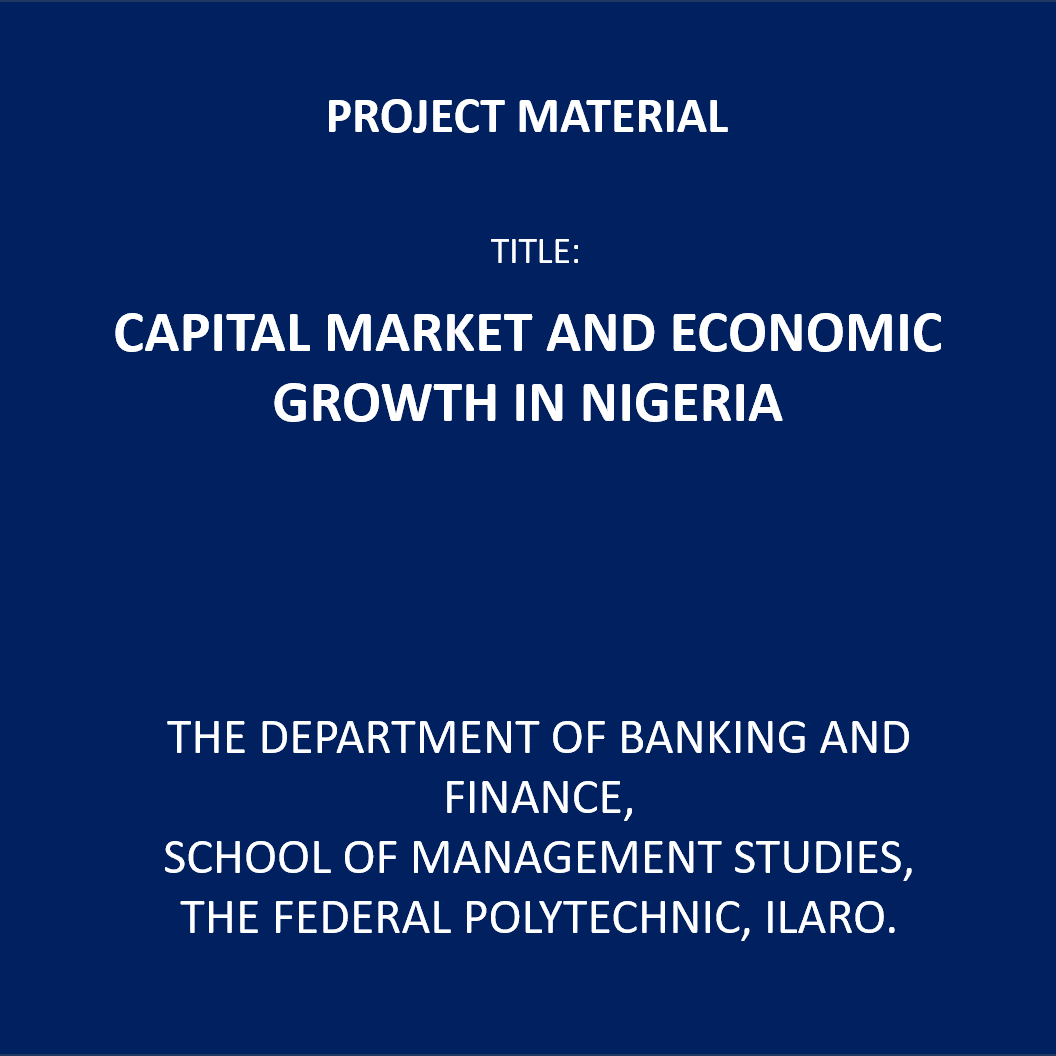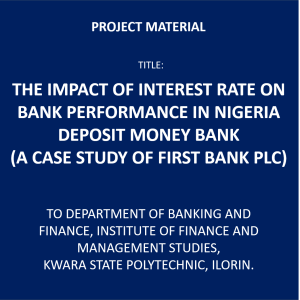No products in the cart.
Capital Market and Economy growth in Nigeria
₦10,150.00
CAPITAL MARKET AND ECONOMIC GROWTH IN NIGERIA
- PROJECT YEAR: 2022
- NUMBER OF PAGES: 66
- INSTITUTE: DEPARTMENT OF BANKING AND FINANCE, SCHOOL OF MANAGEMENT STUDIES, THE FEDERAL POLYTECHNIC, ILARO
Background Information of the Study
The capital market is the segment of the financial system which facilitates the channeling of long-term funds from surplus to deficit economic units thereby stimulating capital formation and socio-economic development. According to Al-Faki (2006), the capital market is a network of specialized financial institutions, series of mechanism, processes and infrastructure that, in various ways facilitate the bringing together of suppliers and users of medium to long term capital for investment in economic developmental project”. The Capital market does not only serve as a source of finance for industries and government, but equally provide a wide range of socio-economic benefit to any country. Perhaps, the single most important social benefit of the capital market (specifically the equity market) is the opportunity it affords a wide spectrum of the populace to participate in the ownership of corporate establishment (Patrick, 2005). By mobilizing funds for channeling into productive Investments, the market brings together those who have and those who need funds at usually competitive prices and conditions acceptable to both parties, thereby ensuring efficient resource allocation while promoting economic growth (Okereke-Onyiuke, 2008).
The rate of economic development of any nation is inextricably linked to the sophistication of its financial markets. Financial markets assist the nation of the world to give the needed financial resources and skill for growth and development, apart from promoting a sound and efficient payment mechanism.
The financial market is an institutional arrangement that facilities the intermediation of funds in an economy. By financial intermediation, it means mobilization of financial resources from surplus spending units and the channeling of such to deficit spending units and the channeling of such funds to deficit spending units for production investment and the generation of assets or securities in the process.
Thus; the financial system generates a wide range of financial instruments (assets), which are means of transferring purchasing power and are tailored to suit the time preferences of both lenders and borrowers.
The financial market performs an economic function by facilitating the transfer of real economic resources from the lenders to the borrowers. By the inducement of interest income, the market facilitates the transference of purchasing power from the lender to the investor who wishes to exercise demand over resources. According to Ewah Sunday, Atim Esang and Bassey Jude (2009), capital market provides the opportunity for the purchase and sale of existing securities among investors thereby encouraging the populace to invest in securities fostering economic growth. It offers access to variety of financial instruments that enables economic agents to pool, price and exchange. It plays a major task in human capital investments which are essential elements of economic growth and development. From this point of view, one should expect that as the capital market develops and deepens, then efficient allocation of the financial resources for the investment is facilitated and thus the frontier of production possibilities is increased (Adam & Sanni, 2005). The Capital market has been one of the major means through which foreign funds are injected into most economies and the tendency towards a global economy is more visible there than anywhere else. It is therefore, quite valid to state that the growth of the capital market has become one of the barometers for measuring the overall economic growth of a nation (Emenuga, 1998).
Financial markets are therefore constitutional whenever a participant with aid of infrastructure technology and over devises facilitates the mobilization and channeling of funds into productive investments. The importance of the financial market lies in financial intermediation to link the deficit sector with the surplus of the economy. In the intermediation process, financial intermediaries engage principally in matching lenders and borrowers. They bring savers and borrowers together by selling debt instruments or securities and deposits to savers for money and lending that money to borrowers. As a result, the lenders of investors receive claims on investment, which have stable market value and high liquidity.
Financial intermediation does not ensure from direct lending and borrowing process but arises from the lending-borrowing proves, which involves the generation and exchange of debt instrument or securities. The point of emphasis therefore is the financial intermediaries use their own liabilities to create additional assets, help mobilize funds, gather together to reap economics of scale and minimize the investors. The financial markets system features a wide array of banking and non-banking financial intermediaries. The banking sub-sector of the system comprises Commercial and Merchant Banks, Development Bank and Central Bank, as the Apex institution.
The non-bank financial institution sub-sector includes a wide range of organizations operating as regulators, facilitators and investors. The list includes the Securities and Exchange Commission Market in Nigeria, to assess its impacts on Nigeria economy. The financial market is really segmented into two major markets, which are: Money Market and Capital Market.
The money market is the market for short-term funds a securities including treasury bills, treasury certificates negotiable certificates of deposits, commercial paper and other funds of less than one year duration on the other hand, the capital market is the market for long-term funds and securities whose tenure extends beyond one year. These include long-term loans, mortgage, bond, preference share, ordinary shares, federal government bonds and industrial loans.
The capital market is a complex institution and mechanism through which intermediate and long run funds are made available to government, business (firm) and individuals. The capital market therefore is an instrumental arrangement that performs the function of mobilizing private and public savings from surplus spending units and channeling them to the deficit units for the production of goods and services. Unlike the many money markets which primarily exist as a means of liquidity adjustment, the capital market provides a bridge of transforming saving into long term investment by using equity bonds, debentures, mortgages and investment stocks to facilitate intermediation.
The capital market is believed to be an important sector of every economy whether it is developed or developing. This is because of the fact that the capital market performs a vital role in the growth of the economy by providing the avenue through which foreign investors make investment in the country which in turn may boost the growth of the economy in terms of foreign Direct Investment (Daniel, 1999).
Dealers in the securities segment of the capital market include banking institutions, stockbrokers, investment and merchant bankers and venture capitalists that intermediate between the market and the public. Well-functioning financial markets are very crucial for the promotion of global financial integration. An efficiently functioning domestic financial market can better position a country’s competitiveness in the markets for global capital (Senbet & Otchere, 2005). Financial sector reforms have therefore been widely used as policy measures to encourage the development of domestic financial systems as well as the dismantling of barriers to international capital flows. African financial markets have been increasingly integrated with the other world capital markets. The encouraging drive towards globalizing capital flows in Africa has led to the growing relevance of emerging capital markets in the continent (Harris, 1997).
The market makes it possible for private and public sectors of the economy to raise long-term capital to execute government development program and from the expansion and modernization of the private business to enhance outputs, employment and income. The capital market is often described as an important part of country’s economy, which is indispensable to economy growth and development. In short, it is a place where nation’s wealth is bough.
Operators in the market include Merchant Banks, Stock broking Firms, Issuing Houses, Development Finance Companies, the Central Bank, Securities and Exchange Commission and the Stock Exchange. With this background; this project attempts to review broad outline the extinction of the Nigerian Capital market, its functions, growth and development with emphasis on the period and challenge for the future especially in the lights of the liberalized trade and exchange regimes adopted under the Structural Adjustment Program (SAP). According to Ewah et al. (2009), the main objectives of establishing the Nigerian capital market is to mobilize savings from various economic units for economic growth and development, provide adequate liquidity to investors, widen the ownership base of assets as well as the creation of a buoyant private sector and provide alternative source of funds for government. Others are to encourage more efficient allocation of new investments through the price mechanism, encourage more efficient allocation of a given amount of tangible wealth through changes in the composition and ownership of wealth, create a built-in efficiency in the operations and allocation in the financial system to ensure optimal utilization of resources, and promote rapid capital formation.
According to (Allen, 1977) economics is a Social science that analyzes and describes the consequences of choices made concerning scarce productive resources. Economics is the study of how individuals and societies choose to employ those resources: what goods and services will be produced, how they will be produced, and how they will be distributed among the members of society. Economics is customarily divided into microeconomics and macroeconomics. Of major concern to macroeconomists are the rate of economic growth, the inflation rate, and the rate of unemployment. Specialized areas of economic investigation attempt to answer questions on a variety of economic activity; they include agricultural economics, economic development, economic history, environmental economics, industrial organization, international trade, labour economics, money supply and banking, public finance, urban economics, and welfare economics. Specialists in mathematical economics and econometrics provide tools used by all economists. The areas of investigation in economics overlap with many other disciplines, notably history, mathematics, political science, and sociology. Rutherford, (1996) opined that economics is a Study of the economy. Classic economics concentrates on how the forces of supply and demand allocate scarce product and service resources.
Macroeconomics studies a nation or the world’s economy as a whole, using data about inflation, unemployment and industrial production to understand the past and predict the future. Microeconomics studies the behavior of specific sectors of the economy, such as companies, industries, or households. Over the years, various schools of economic thought have gained prominence, including Keynesian Economics, Monetarism and Supply-Side Economics. According to (Harper, 2001) Economics is the social science that analyzes the production, distribution, and consumption of goods and services. The term economics comes from the Ancient Greek οἰκονομία (oikonomia, “management of a household, administration”) from οἶκος (oikos, “house”) + νόμος (nomos, “custom” or “law”), hence “rules of the household)”. Current economic models emerged from the broader field of political economy in the late 19th century. A primary stimulus for the development of modern economics was the desire to use an empirical approach more akin to the physical sciences (Clark, 1998).
Femi Adekanye (1986) enumerated the relevant functions of capital market in Nigeria cannot be over-emphasized.


